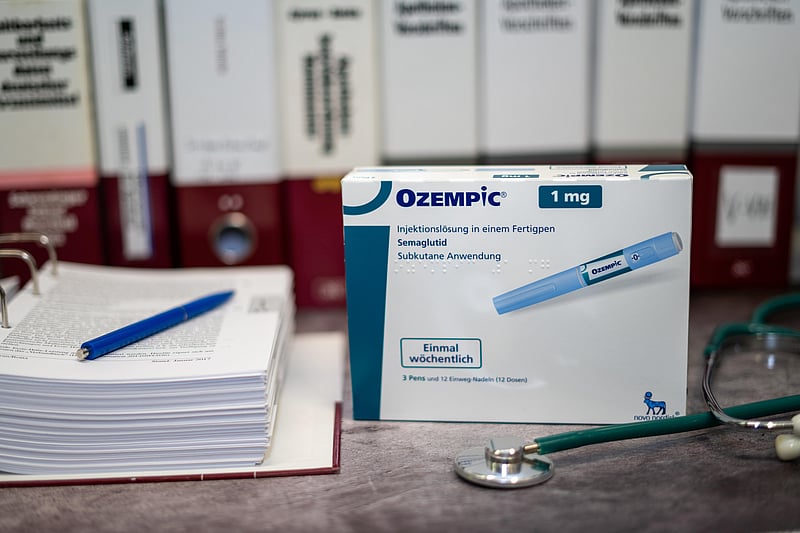Get Healthy!

- Amy Norton
- Posted September 7, 2023
In Small Study, Ozempic Helped People With Type 1 Diabetes Quit Insulin Treatments
The blockbuster drug Ozempic has become a household name for its ability to spur weight loss. Now an early study hints at an intriguing possibility: The drug might allow people newly diagnosed with type 1 diabetes to drop their daily insulin shots.
Experts emphasized that the findings are based on only 10 patients, and larger, longer-term studies are necessary.
However, all 10 patients were able to stop their meal-time insulin injections after starting semaglutide, the active ingredient in Ozempic. And most were also able to drop their long-acting insulin, which is used to keep overnight blood sugar levels in check.
"It sounds like science fiction, that people with type 1 diabetes can stop taking insulin," said lead researcher Dr. Paresh Dandona of the State University of New York at Buffalo.
"This really opens up a new area of research," he said. "Could we use this drug to change the natural course of type 1 diabetes?"
Type 1 diabetes arises when the immune system mistakenly goes after cells in the pancreas that produce the hormone insulin. Insulin has the critical job of moving sugars from food into the body's cells to be used as fuel.
In order to survive, people with type 1 diabetes have to take synthetic insulin, via daily injections or a pump attached to the body.
The disease is far less common than type 2 diabetes, which is often associated with obesity and can be managed with lifestyle changes and various medications. They include a newer drug class called GLP-1 receptor agonists, which are usually taken by injection.
Ozempic is one of them. It was approved in the United States in 2017 to treat type 2 diabetes. Then in 2021, a medication containing a higher dose of semaglutide -- called Wegovy -- was approved for treating obesity.
Semaglutide is not approved for type 1 diabetes. But researchers have been studying whether it -- or other newer type 2 diabetes drugs -- can help manage the disease when added to insulin.
These latest findings -- published Sept. 7 in the New England Journal of Medicine -- raise a different possibility. Could semaglutide replace insulin for people recently diagnosed with type 1 diabetes, at least for a time?
When people are first diagnosed with the disease, Dandona explained, they still have a "reserve" of functioning beta cells (the pancreas cells that produce insulin). In fact, many patients have a so-called "honeymoon phase" when they do not need to make much insulin.
So Dandona's team reasoned that giving semaglutide at that time might improve the cells' functioning to the degree that people could stop their insulin injections.
The drug works by helping beta cells produce more insulin when blood sugar is high, preventing the liver from releasing too much sugar, and slowing digestion.
The 10 patients in the study were between the ages of 21 and 39, and were within three months of their type 1 diabetes diagnosis when they started semaglutide. First, they took a very low dose of the drug by weekly injection, to make sure their blood sugar did not drop to dangerously low levels.
Gradually, the semaglutide dose was increased, and mealtime insulin doses were dialed down.
Within three months, all 10 patients were able to stop their mealtime insulin, and within six months, seven stopped their long-acting overnight insulin as well. That was still the case at the end of the one-year follow-up.
On average, the patients' A1C -- a measure of long-term blood sugar control -- was below 6% at the one-year mark. That's well within the target range for people with type 1 diabetes.
Diabetes experts who were not involved in the study called the findings intriguing.
"Overall, these are promising early results, suggesting it may be possible to extend the honeymoon period in early type 1 diabetes," said Josh Vieth, director of research for the nonprofit JDRF, which funds type 1 diabetes research.
Semaglutide has already been shown to improve blood sugar control when people with long-established type 1 diabetes add it to insulin, noted Dr. Mary-Elizabeth Patti, director of the hypoglycemia clinic at Joslin Diabetes Center in Boston.
The new findings, she said, "raise the intriguing possibility" that the drug can also help newly diagnosed patients by combating "glucotoxicity" -- where chronically high blood sugar further impairs the functioning of a patient's remaining beta cells.
However, all three experts said much more research is needed.
Vieth also pointed to a theoretical downside of the approach: Could it actually add more stress to patients' beta cells, and what would that mean for their functioning over the longer term?
If semaglutide could replace insulin for a prolonged period, that would "greatly improve" patients' quality of life, Dandona said. A once-weekly injection has obvious advantages over taking multiple injections a day.
Beyond that, Dandona said, it's very hard to adjust insulin doses to match food intake, which causes inevitable "ups and downs" in people's blood sugar levels. If those swings can be reduced over a long period, that might curb the risk of diabetes complications, like nerve damage and eye, kidney and heart disease.
One of Dandona's colleagues on the study has had speaking engagements with Novo Nordisk, maker of Ozempic and Wegovy. The researchers report no other financial connections to the company.
More information
JDRF has more on GLP-1 medications and type 1 diabetes.
SOURCES: Paresh Dandona, MD, professor, medicine, Jacobs School of Medicine and Biological Sciences, State University of New York at Buffalo, Williamsville, N.Y.; Mary-Elizabeth Patti, MD, director, hypoglycemia clinic, Joslin Diabetes Center, associate professor, medicine, Harvard Medical School, Boston; Josh Vieth, PhD, director, research, JDRF International, New York City; New England Journal of Medicine, Sept. 7, 2023







